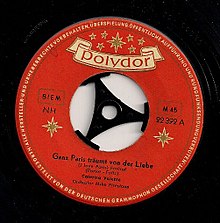All of Paris dreams of love
All Paris dreams of love is the title of the German version of the Cole Porter song I Love Paris , which was interpreted by Caterina Valente in 1954 . The song became her most successful hit .
History of origin
The Cole Porter composition I Love Paris comes from his musical Can-Can , which premiered on May 7, 1953 at the Shubert Theater in New York City . In June 1953 an instrumental version of Les Baxter came onto the market.
Caterina Valente, who had just started her singing career and had made the recordings for her first LP with the Kurt Edelhagen Orchestra in November 1953 , knew immediately that I Love Paris would become her favorite song. Born and raised in Paris, she had the first opportunity to see Cole Porter's musical on Broadway in New York in 1954 . Immediately after visiting the musical, she called the hit writer Kurt Feltz in Cologne and asked him to write a German text for her. At that time, Feltz was specialized in hit texts with wanderlust, especially in German text versions for foreign-language originals. In his German lyrics he relies on the erotic attraction of the French capital and titled the song with Ganz Paris dreams of love . It romanticized the French capital as the home of love. This association was not new; Since Jacques Offenbach's life in Paris at least, it has been considered to have been introduced into the world of music.
On November 3, 1954, Caterina Valente was accompanied by Kurt Edelhagen (under the pseudonym "Orchestra Mike Firestone") while recording in the Cologne exhibition hall . Albert Vossen's harmonica solos shape the instrumental part of the song and give it a musette- like sound. The musical change from minor in the verse to major in the chorus creates a special tension. Feltz is the atmosphere again that in the recording of dreams All of Paris from the love had prevailed: "One must nevertheless feel that they not only sings, to make money, but because she likes it." The B- Page When night falls in Paris was recorded the same day. Caterina Valentes version became the most successful version of the piece.
Publication and Success
The single Ganz Paris dreams of love / When night falls in Paris ( Polydor # 22 392) was released in November 1954, took first place in the German jukebox hit parade from March to July 1955 and sold over 900,000 copies. The song became Caterina Valentes’s best-selling track and made her the star of the Polydor repertoire.
Cover versions
Besides Valente's German version, there are at least 25 other German-language cover versions . Fred Bertelmann brought out his version in 1954, followed in 1955 by Angèle Durand , Vico Torriani , the Hansen Quartet and Heinz Schachtner, among others . It wasn't until ten years later that Corry Brokken and Peter Alexander remembered the romantic song. Connie Kollet followed suit . However, none of the versions could reach the German charts.
Individual evidence
- ^ Voice like an instrument , Der Spiegel 15/1955 of April 6, 1955, p. 39 ff.
- ^ Bettina Greve, Sternenhimmel: Polydor - The Chronicle of a German Record Brand , 2001, p. 93.
- ↑ Ingo Grabowsky / Martin Lücke, The 100 hits of the century , 2008, p. 220.
- ^ Voice like an instrument , Der Spiegel 15/1955 of April 6, 1955, p. 43.
- ↑ Good bye, Caterina , Der Spiegel 3/1959 of January 14, 1959, p. 49.
